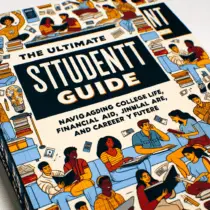Embarking on your college journey is an exciting yet challenging experience. Balancing academics, social life, financial responsibilities, and future career planning can seem overwhelming. However, with the right strategies and resources, you can navigate this journey successfully. This ultimate student guide will help you make the most of your college experience, manage your finances, and plan for a rewarding career.
Navigating College Life
College life is a mix of academic responsibilities, social activities, and personal growth. Here’s how to make the most of it:
1. Time Management
- Create a Schedule: Use planners or digital calendars to organize your classes, study time, extracurricular activities, and social events.
- Prioritize Tasks: Identify urgent and important tasks and tackle them first.
- Avoid Procrastination: Break down large tasks into smaller, manageable steps to avoid feeling overwhelmed.
2. Academic Success
- Attend Classes Regularly: Active participation helps in better understanding and retention of course material.
- Engage with Professors: Build relationships with your professors. They can offer valuable guidance and potentially write recommendation letters.
- Utilize Campus Resources: Take advantage of tutoring centers, libraries, and study groups.
3. Social Integration
- Join Clubs and Organizations: Engage in activities that interest you to meet new people and build a support network.
- Attend Campus Events: Participating in campus events can help you feel more connected to your college community.
- Balance Social and Academic Life: While socializing is important, ensure it doesn’t interfere with your academic responsibilities.
Understanding Financial Aid
Managing finances is a crucial aspect of college life. Here’s how to navigate financial aid and budgeting effectively:
1. Types of Financial Aid
- Grants and Scholarships: These are typically merit-based or need-based and do not require repayment.
- Federal and Private Loans: Federal loans often have lower interest rates and flexible repayment options compared to private loans.
- Work-Study Programs: These provide part-time jobs for students with financial need, helping them earn money to pay for education expenses.
2. Applying for Financial Aid
- FAFSA: Complete the Free Application for Federal Student Aid (FAFSA) annually to determine your eligibility for federal aid.
- Scholarship Search: Regularly search and apply for scholarships. Many organizations offer scholarships based on various criteria.
- Financial Aid Office: Consult your school’s financial aid office for guidance and to ensure you’re maximizing available resources.
3. Budgeting and Saving
- Create a Budget: Track your income and expenses to manage your finances effectively. Include tuition, books, housing, food, transportation, and entertainment.
- Avoid Unnecessary Debt: Use credit cards wisely and avoid taking on more debt than necessary.
- Look for Discounts: Utilize student discounts for textbooks, software, and other essentials.
Planning for Your Career
Planning your career starts early in college. Here’s how to prepare for a successful transition from college to the workforce:
1. Career Exploration
- Self-Assessment: Identify your strengths, interests, and values. Tools like personality tests and career assessments can help.
- Research Careers: Explore different career paths related to your major and interests. Use online resources, attend career fairs, and talk to professionals in the field.
2. Skill Development
- Gain Relevant Experience: Internships, part-time jobs, and volunteer work can provide valuable experience and enhance your resume.
- Develop Soft Skills: Communication, teamwork, problem-solving, and leadership skills are essential in any career.
- Continuing Education: Take advantage of workshops, seminars, and additional courses to build your knowledge and skills.
3. Job Search Strategies
- Resume and Cover Letter: Create a professional resume and cover letter tailored to each job application.
- Networking: Build and maintain professional relationships through networking events, LinkedIn, and alumni associations.
- Interview Preparation: Practice common interview questions and develop your ability to articulate your experiences and skills confidently.
Conclusion
Navigating college life, managing financial aid, and planning your career can be daunting, but with the right approach, you can turn these challenges into opportunities. By staying organized, seeking support when needed, and actively planning for your future, you can make the most of your college experience and set the stage for a successful career. Remember, college is not just about academics; it’s about personal growth, building relationships, and preparing for the future. Embrace the journey and enjoy the ride!






